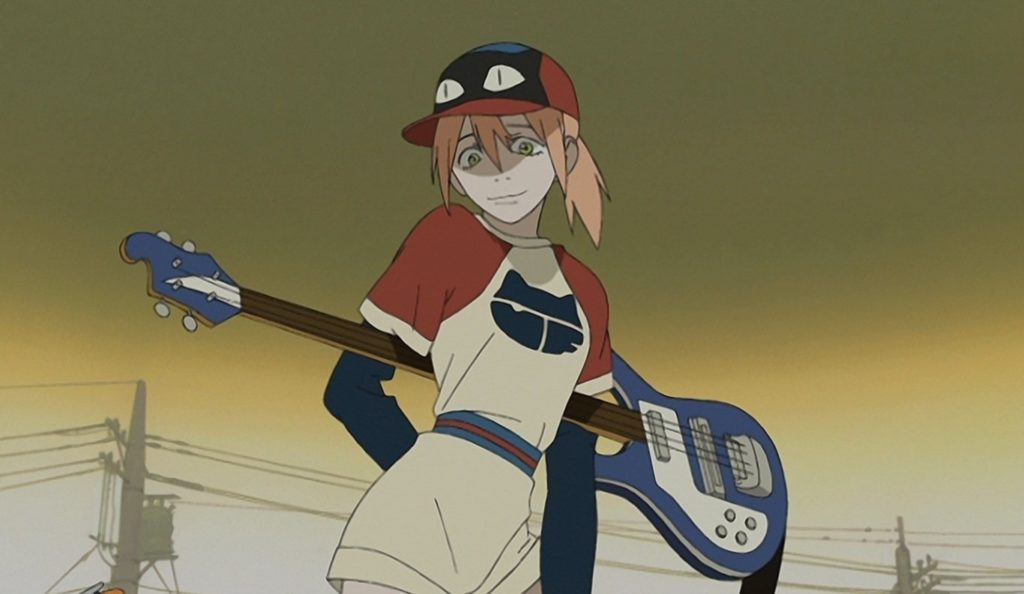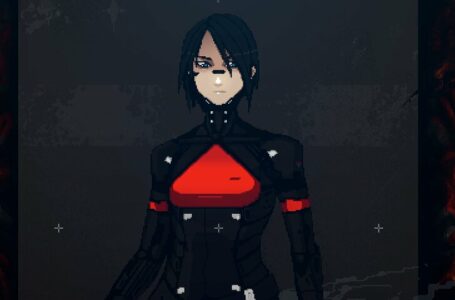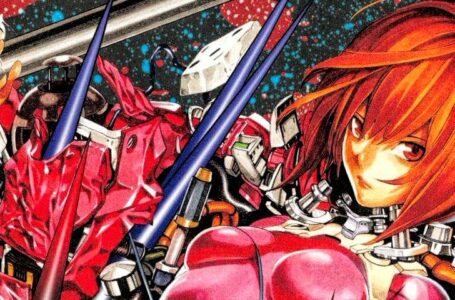Waifu Wednesday: Haruko Haruhara (FLCL)
It’s Waifu Wednesday once more, and I’m feeling ever so nostalgic for a certain someone in this week’s entry. FLCL was a prime choice of an off-the-wall anime to experience during adolescence, simply because returning to it as an adult allows you to look at it differently and appreciate how brilliant it is. My teen brain couldn’t keep track of everything that was happening on screen and barely made sense of it!
In the case of today’s subject Haruko Haruhara, the charismatically psychotic alien punk girl, she’s never ceased to be a significant discussion point even 21 years after the show’s initial airing, thanks to everyone’s ever-changing perceptions. You either love to hate her, or hate to love her. So without further ado, let’s celebrate what this iconic Gainax waifu represents — for better and for worse!
This Waifu Wednesday piece is spoiler-free!
Who is Haruko Haruhara?

We’ve got a hard question to tackle first, because how do we even go about explaining this? Firstly, Haruko is a central character of FLCL. She is an investigator for the Galactic Space Police Brotherhood, and comes to the fictional city of Mabase located in Japan; she settles there for a period of time as the maid of main character Naoko’s household.
The reason for this mostly comes down to two fateful happenings. Firstly, she immediately runs Naoko over with her Vespa and knocks him square on the head with her guitar, which seems to kickstart a number of rather questionable events — more often than not originating from his forehead. And the other reason concerns her own mission to track down the most powerful pirate that space has ever known: Atomsk.
Initially, Haruko presents herself as a bubbly, free-spirited personality, and this act is juxtaposed with her actually being a morally ambiguous anti-hero once her true intentions come to light. It’s all fun and games until… it’s not, but more on that shortly.
Why we love Haruko Haruhara

Now let’s get into the juicy details of why we’re so enamoured with her. Haruko is a phenomenon, a feeling, a fantasy – quite literally, in fact. She appears as the anime equivalent of the manic pixie dream girl archetype popularised by Hollywood cinema. The anime does this quite obviously, with frequent usage of shots that cater to fanservice and the male gaze. This is a deliberate stylistic choice for her whenever she’s the only female character on screen; she is obviously designed to behave with the most freedom and sexual liberation, even within a plot focused on a “coming of age” theme.
Additionally, her actions and words are purposely hard to decipher and understand to the point that whether or not she is being genuine is never clear. Instead, it falls to the viewer to see what they want to see from her — with all the positives and negatives their own perception of her comes with. The sooner its audience notes this the better, since Haruko’s entire deal with how the audience views her is, for most of the show’s run, a parallel to her relationship with Naoto. It’s one-sided and unrequited.
Haruko is idealised and objectified by both adults and children in the anime, but for everything that points to how much of a dream she is, she still manages to be grounded despite every single bonkers scene she appears in. Because despite Haruko very much falling into the manic pixie dream girl archetype, she frequently subverts this and has plenty of her own agency. She has her own personal character arc and is integral to the series’ overall plot progression — particularly with the reveal of her true intentions. And she puts the anime’s main messages at the forefront in some of the most unexpected ways.
She weaponises maturity and sexuality — but at the same time is seemingly uncomfortable in being truly intimate; she’s hard to read whenever conflict arises, particularly whenever someone exhibits genuine and heartfelt emotions. She is an enigma who is quick to use her guitar and bike to dish out some serious damage, but anything to do with genuine emotion is truly alien to her. Which naturally leads me onto her unexpectedly meaningful arc and its life lessons.
Why you will love Haruko Haruhara

Haruko acts as the catalyst for a wide amount of events to transpire within FLCL, both obviously and subtly. She manages to bring out the very crux of the characters’ faults and issues no matter what they may be – it’s quite an impressive feat for a supposed 19 year old to achieve. On the flip side, her depth can be seen through how she ends up being the voice of reason in the show’s final scenes when parting ways with Naoto. She’s righting her wrongs at this point, and has learnt her lesson of valuing others when reaching for and fixating on one’s own goals.
Because, by all accounts, she is no angel — she’s the evildoer of FLCL with masked intentions throughout. To her, bringing about the end of the world and the deaths of those she has met and connected with would not be an issue — so long as her mission is a success, and she has seen some benefit. And what that goal encompasses is her chasing her own idealised version of herself: to become the best version of Haruko, no matter what might stand in her way. This is her biggest flaw; a weakness that she develops from in the end of everything.
Ultimately, Naoto teaches Haruko that she is complete already, and that she does not need to become anything that she is not. Haruko, meanwhile, teaches the audience that we can each learn from one another without being inconsiderate and insincere. Our personal development is of the utmost importance during our early stages of life — a time when we are at our most vulnerable and influential — and FLCL tackles this with surprising nuance and subtlety. This is all the more remarkable when this core message comes from such a hyperactive and seemingly mindless character. Who would have thought we’d have taken something so substantial from her?
Whilst she most definitely brings a healthy dose of unpredictability to FLCL on initial viewing, she leaves an everlasting impression because of the intrigue that surrounds her. Her mysteriousness and pursuit of the “ideal” makes her an unforgettable and necessary part of FLCL, which in turn makes her one of the key ingredients to its lasting appeal. She makes FLCL what it is, and it would not have been the same without her.
FLCL represents interpretation at its finest — nothing is truly to be made complete sense of, nor will it be viewed in the same way by everyone. Honestly, FLCL deserves essays on top of essays, no matter how old it gets, for how it manages to cover what it does and with such originality; maybe we’ll add to that one day. (I’m up for reading more about it! – Ed.) But for now, this has been our coverage on the one and only Haruko Haruhara.
Just know that if you haven’t seen FLCL already, it’s never too late.
Join The Discussion
Rice Digital Discord
Rice Digital Twitter
Rice Digital Facebook
Or write us a letter for the Rice Digital Friday Letters Page by clicking here!
Disclosure: Some links in this article may be affiliate links, which means we may earn a small commission if you make a purchase after clicking on them. This is at no additional cost to you and helps support Rice Digital!
- Sigh of the Abyss: Shadow Bonds – Prologue Review - October 7, 2023
- Is She The Wolf? is wickedly addicting TV - October 6, 2023
- The steady consumption of Slow Damage - October 5, 2023







